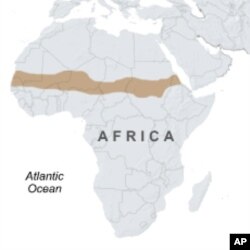Niger says it needs $123 million of international assistance to make up for food shortages this year. Poor rains across Africa's Sahelian region have brought below-average harvests in Niger, northern Nigeria, central Chad and northeastern Mali and Burkina Faso.
Prime Minister Mahamadou Danda says Niger needs a huge commitment of international support to deal with its immediate food crisis and restructure agricultural production to become more self-sufficient.
The prime minister says there is critical food insecurity in all of Niger that requires action to solve such a huge crisis.
Mr. Danda was named prime minister by military rulers who took power in a coup last month. Addressing so publicly the country's immediate food needs is a considerable change from the approach of former president Mamadou Tandja.
Prime Minister Danda says a survey of food vulnerability shows that more than two-and-a-half million people in Niger, representing more than 380,000 families, are severely food insecure, meaning they have less than ten days of food stocks.
The prime minister says moderate food insecurity also affects nearly 40 percent of the population. That is a big jump from the 15 percent of people who were moderately food insecure in 2008. So overall, six out of ten families in Niger are either severely or moderately food insecure.
The United Nations estimates that at least 200,000 children face severe malnutrition in Niger this year.
Millet prices in the capital, Niamey, are 42 percent higher than 2007. Severe pest infestation and poor rains have led to a 34 percent drop in cowpeas, which are the main source of income for small-scale farmers.
Shorter-than-usual rains in September and October of last year have also hurt cattle.
Prime Minister Danda says Niger's 2009 livestock production was down 16 million tons from the previous year because of a shortage of grazing, with cereal production for animals down 13 percent from 2008.
Across the Sahel, the United Nations estimates that the need for food assistance will be higher than usual at least through June. Poor farmers in Niger, Chad, and northeastern Mali will likely need food aid until the early harvests of August.
